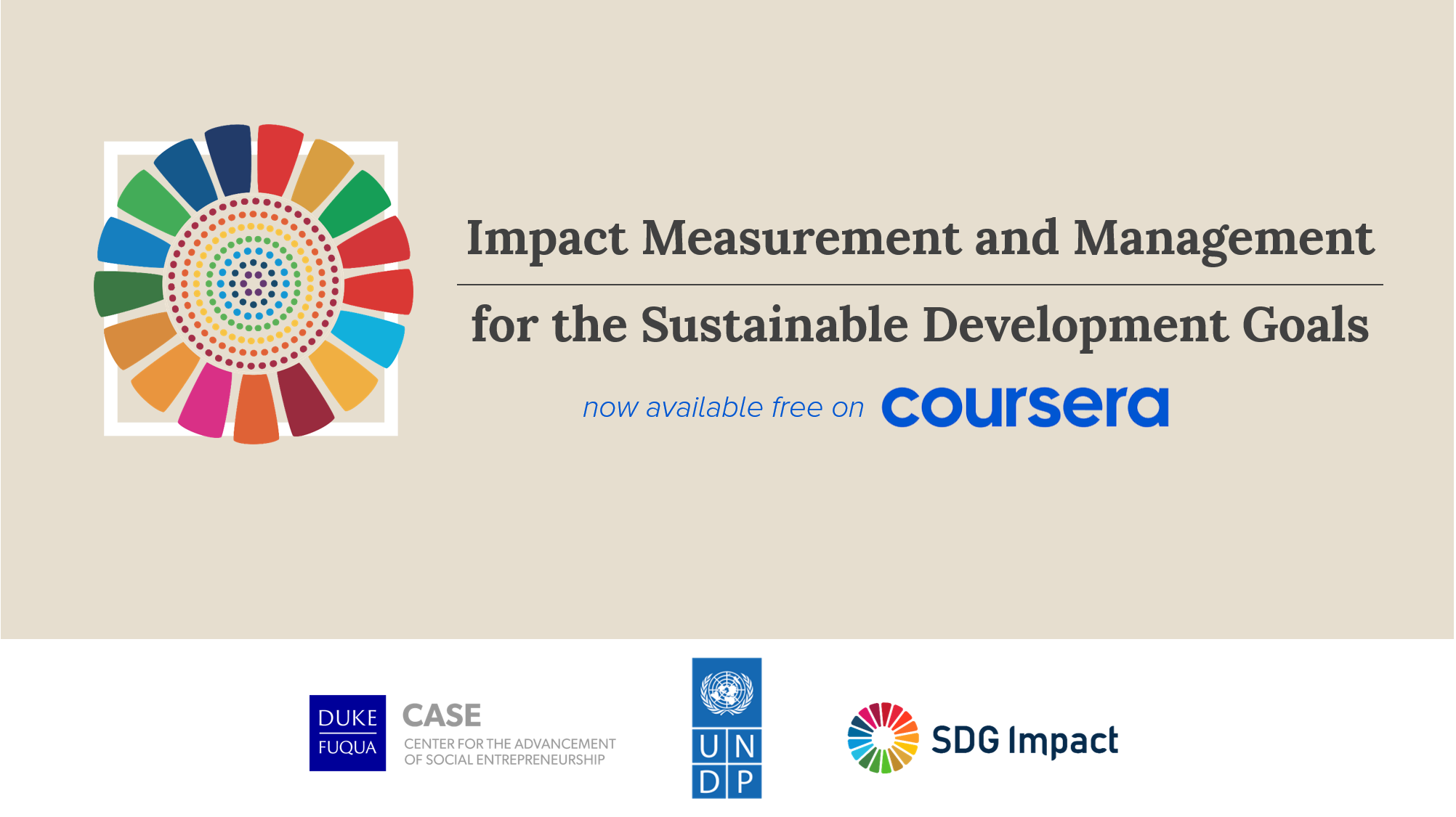NEW: The United Nations Development Programme and CASE at Duke have released a free online training for global enterprises and investors on impact measurement and management for the SDGs.
CASE and ImpactAlpha will launch Optimizing for Impact, a multiweek selection of lessons and video clips from the course. We’ll kick it off with a 60-minute how-to in impact measurement and management on ImpactAlpha’s Agents of Impact Call, Tuesday, September 28 at 10am PT / 1pm ET / 6pm London. Sign up here.
An increasing number of Investors share a global to-do list with the UN Sustainable Development Goals. Now, we all need to get better at achieving real impact and progress toward them.
As fires, floods, hurricanes, civil unrest, and pandemics rock our planet, it seems clear we don’t have a lot of time to waste.
Recently, I met with an impact investor working on a report on how her fund addresses several of the SDGs. “I’ve read the reports. I know the alphabet soup of acronyms. I’ve gone to the conferences, connected with peers about their work,” she said.
“Still, I often feel like I’m flying blind.”
The impact investor asked me to review her practices and internal reports and tell her what to do better. “Am I doing enough to enable the impact our investors want to see? How do I know if it’s good enough? ” she asked.
And as impatient activists, skeptical customers and increasingly inquisitive regulators in both Europe and the U.S. dig into the efficacy of ESG and impact investing vehicles and marketing, this impact investor wanted to know, “How do I keep us from being accused of impact-washing?”
Industry standards
The regulators are coming. In 2019, the European Commission passed the Sustainable Finance Disclosure Regulation, or SFDR requirements. This July, those requirements became applicable to all companies doing business in the European Union. The requirements include concrete reporting around sustainable development.
In the U.S., the SEC’s Gary Gensler says climate disclosure rules are coming this year, including things like new names rules to disclose criteria and data for words like sustainable, green, and low-carbon. Gensler is looking at disclosure of employee and owner demographics and diversity and inclusion in asset management.
With investments in sustainable assets doubling in 2020, according to BlackRock, nearly everybody in financial services has to have basic familiarity with the demands of standardized reporting that integrates ESG, SDG, and impact measurement.
We have work to do. PWC reports that in 2019 72% of companies mentioned the SDGs in their reporting. But only 14% mentioned specific targets, and only 1% reported quantitative measures to show their progress.
Likewise, a headline from the Global Impact Investing Network’s annual survey of investors touted the 73% of investors using SDGs as targets or for metrics. They also named sophistication in impact measurement and management as in major need of standardization and improvement.
Our team at CASE was commissioned by United Nations Development Programme’s SDG Impact group in late 2019 to help fill this practice gap, and to make verifiable impact measurement and management easier.
What resulted after two years of research and production, including input and examples from hundreds of practitioners, is our new online course, called Impact Measurement & Management for the SDGs.
The course integrates standards and frameworks from the Impact Management Project, the UN Development Program’s SDG Impact Standards, the Global Impact Investing Network, the IFC and others. The industry and standards bodies have been working for over two years to align definitions, nomenclature, accounting, and reporting standards so that investors know how to report and pass a third-party verification of their impact.
The full content of the course is available on the Coursera platform for free, with a certification of completion available for $49. It is practitioner-focused, video-based, and self-paced – users can launch the course within minutes from anywhere in the world, use the content in any order, download the material, and return whenever they like.
CASE is pleased to partner with ImpactAlpha to make the baseline knowledge widely available to Agents of Impact. Our Optimizing for Impact series will help ImpactAlpha subscribers keep abreast of emerging best practices and advance their own practices in impact management.
The multiweek Optimizing for Impact series will provide a selection of lessons and video clips from the course, as teasers or trailers for the full eight-hour course. The posts will provide context about the rest of the training, and we’ll moderate a Slack channel where ImpactAlpha subscribers can discuss, add examples and share impressions from the course and their work.
We’re launching Optimizing for Impact on ImpactAlpha’s Agents of Impact Call, Tuesday, September 28 at 10am PT / 1pm ET / 6pm London. I’ll lead a 60-minute how-to in impact measurement and management and walk through the four steps for investors: set strategy, integrate, optimize and reinforce. Our work suggests that optimizing remains the weakest link, hence the focus of the series. Sign up here.
We look forward to feedback, insights, and input on how to make impact management an everyday practice from the ImpactAlpha global community of private sector practitioners.
Private-sector talent
Familiarity with the emerging industry standards for impact management is becoming de rigueur for finance professionals of all kinds.
“We see this as a cost-effective way for organizations to train their staffs, level-set their new hires, and increase their own effectiveness at addressing the UN SDGs,” says Bill Boulding, the dean of Duke University’s Fuqua School of Business. He explains it’s unusual to put this level of educational material online for free. “We are excited about this effort, as it fits with our goal of helping develop practices that enable businesses to work toward the common good.”
The UN Development Program is keen to help private investors align their activities with the SDGs. “This online training will enable private sector players worldwide to become well-versed in applying accepted impact measurement and management (IMM) practices and the SDG Impact Standards,” said UNDP SDG Impact Director Fabienne Michaux.
Cliff Prior, CEO of the Global Steering Group for Impact Investment, believes this is an important step in the trajectory of impact investing and that the rigor and discipline of the course can provide a firm base for sustainable development. “Impact measurement and management is rapidly heading towards becoming the new norm, as so many of the future investment opportunities offer positive impact,” Prior says. Especially important, he says, the course is global, with “examples and materials from practitioners and advisors from across six continents,” and carefully integrates the evolving guidance from the Impact Management Project.
Indeed, from the Impact Management Project, Mike McCreless, sent “Kudos to CASE and the SDG Impact teams for a job well done!” McCreless, executive director of the IMP’s Impact Frontiers project said, “The course is both broad in scope and up-to-date with latest developments, achieving a rare combination of accessibility and technical accuracy.”
- Register for the course, Impact Measurement & Management for the SDGs.
- Answer The Call: Optimizing Impact, Tuesday Sept. 28. RSVP now.
- Watch for the series, Optimizing Impact, on ImpactAlpha. Subscribe here.
You wouldn’t trust a financial report that included goals but few targets and fewer results? Don’t trust a shoddy impact report, either.
We believe it’s time for ESG and impact reporting to transform from goals to accountable, verifiable impact management. We can show you how.
Clark Cathy is faculty director of the Center for the Advancement of Social Entrepreneurship (CASE) at Duke University’s Fuqua School of Business and founding director of the CASE i3 Initiative on Impact Investing.











